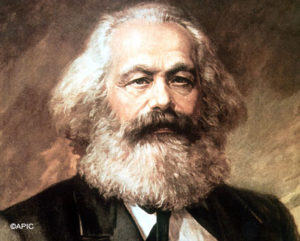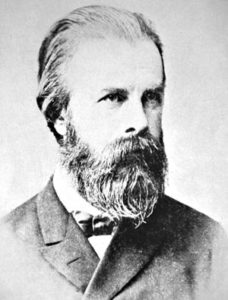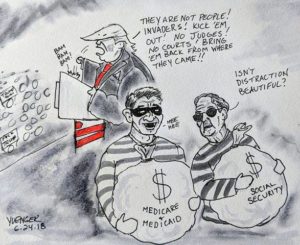Bruce Bugbee, Utah State University Department of Plants, Soils and Climate, has studied plant growth in controlled environments for most of his career. Here he presents the results of his analysis of the environmental effects of Vertical Farming/Indoor Agriculture.
Category: Economic Bullshit
Is Libertarianism compatible with Capitalism?
The Harvesting of America by the presidency of Donald Trump
Escaping from Capitalism
Several years ago, I recommended that C. D. Broad be considered the default philosopher of the twentieth century. By “default” I meant what in computer word processing programs is meant by factory settings. These are considered the most useful or the most widely used settings. I had in mind for Broad what, for the medieval world, was the role of Aristotle. Well, the only discernible effect of my proposal was to resurrect Broad from oblivion.
My recommendation of Broad was restricted to logic, epistemology, metaphysics, and ethics. It did not include “political economy” — a somewhat neglected phrase. Why is it neglected? Because the economic system of capitalism is presumed by those in power and by those who are influenced by those in power to be the desired system; consequently, courses in colleges which are offered for the study of how this economic system works are simply called “Economics.” If they were to be called “political economy,” that would suggest a reflective criticism — which is not wanted.
That brings me to the question of who is or was the default philosopher of “political economy?” Here I have no elbow room for recommendations, because history has made Karl Marx the default philosopher of political economy. As Eric Wolf remarked in Europe and the People Without History (1982), “. . . the social sciences constitute one long dialogue with the ghost of Marx.” (p. 20)

And this is recognized by the prominent Internet site: “Marxists Internet Archive.” Although the site rightly makes Marx the pivotal — or, using my term “default” — thinker, the archive really covers what is better called “Socialism.” Let me explain. If Capitalism is the economic system which favors the employer, then socialism is the economic system which favors the employee. Viewed this way, the State (which means a centralized government) can then be used by socialists either for reform or for revolution. The other alternative for socialists is to get rid of the centralize State altogether, and replace it with small, grassroots communal democratic governments. This is the goal of anarchists. (Incidentally, the idea that government can be abolished entirely is a myth because government is simply the customary rules, or rules which people have adopted freely, or rules which have been imposed on them.)
As to the Marxist Internet Archive, though it includes some of the major anarchists, it neglects many. Other than using Wikipedia to get oriented in anarchism, I recommend using “Anarchy Archives” . I have also tried to compile an alphabetical bibliography at “Anarchism: the Unfinished Revolution.”
Since these socialist archives are in English, they do not cover some key writers in foreign languages. My personal interest, in part, is in the anarchist developments in Ukraine and during the Russian Revolution. In this regard, I note the absence of Mikhailo Drahomanov in socialist archives, and the absence of Nestor Makhno in the Marxists Internet Archive. Anarchists have almost universally recognized the achievements of Nestor Makhno, and there is a site devoted to him “The Nestor Makhno Archive” . My own mini Nestor Makhno archive is here.
As to Mikhailo Drahomanov, he has, as it were, passed under the radar. Although there is in Kyiv, Ukraine, the National Pedagogical Drahomanov University, it has not given him the attention he deserves. In 1991, Myroslav Alexander Moroz published a full-scale bibliography of works by and on Drahomanov. It is available in Ukrainian, with expansions, here. As to English sources, Ivan Rudnytsky wrote several articles in English on the political views of Drahomanov, and he tried to make him available to the English public in 1952, with translations and commentaries:
Rudnytsky Ivan L. Mykhailo Drahomanov: A symposium and Selected Writings. New York: Ukrainian Academy of Arts and Sciences in the U.S., 1952.
I wrote a piece on these two anarchists: “Two Ukrainian Anarchists:
Mykhailo Drahomanov and Nestor Makhno” (2011)


Mykhailo Drahomanov Nestor Makhno
Rosa Luxemburg: Reform or Revolution?
Rosa Luxemburg at Wikipedia
The text of Reform or Revolution (1900)
Panel at the Left Forum 2016:
Laura Flanders introduces Sandra Rein on Rosa Luxemburg
Chris Hedges on Rosa Luxemburg
Richard Wolff on Rosa Luxemburg
World Bullshit Turmoil from a Capitalist’s Perspective
I will give this talk pretending that I am a capitalist.
I am a capitalist. No, I am an entrepreneur. That sounds more innocuous. What does that mean? It means I have a business which provides services and/or I have a factory which produces widgets. In both instances, I need wage-workers who will provide the services and the labor of manufacture. Also I need a market — a place to sell my services and products. But the indispensable factor here is the workers. Where am I to get cheap workers?
Well, they are everywhere in abundance. They are, as it were, a reserve army of potential workers. They are people who without work are basically the homeless. You say that the homeless are only a small minority. Well, yes, because once they become workers they stop being homeless. But if they do not work, or are not involved in crime and dependency on others, they become homeless. The government — which, of course, works for me — has set up the laws in such a way that you are mostly either homeless or you work for someone like me. And as an entrepreneur, as a business person, that is how I want things to be.
My fear is that this pool of the potentially homeless, that is the pool of potential workers (in short, as Marxists call them, the proletariat) is somehow removed from me. How can this happen? The greatest danger is that the government falls into the hands of those who will institute — God forbid — an agrarian reform. “Agrarian reform” is a eulogistic term for giving away land to people for free. If people have access to free subsistence land, then it will be very difficult (or unprofitable) to hire them. This is the greatest possible evil that can occur to someone like me, a capitalist. To prevent this, I will muster all the forces of government to prevent this from occurring here or anywhere else in the world. My government must intervene in all places where there is any whisper of “agrarian reform.”
There was danger of this occurring in Ukraine in 1918 under the anarchist Nestor Makhno, but miraculously the Bolsheviks prevented this from succeeding. Then another anarchist revolution occurred in 1936 in Spain, but thank goodness Mussolini, Hitler and Stalin by backing Franco prevented this disaster. Then in 1954 in Guatemala, that no good Arbenz tried to get the land back from the United Fruit Company. But our CIA under Allen Dulles orchestrated a coup, and put a stop to this nonsense. Then there were those nasty Sandinistas in Nicaragua who came to power in 1979. They too were full of “agrarian reform.” Well, my hero, President Reagan, though having to use illegal and brutal clandestine methods, put a stop to this danger. Unfortunately, the only place in our hemisphere where agrarian reform succeeded was Cuba. But we quarantined this disease of Cuban agrarian reform through a series of embargoes, which still exist. You say that Cuba is a small place relative to the world. But you forget that such examples are contagious, giving rise to ideas of reform or even revolution.
And of course we have to stop agrarian reform everywhere, directly as in Vietnam, we burned their villages and drove them into the cities where they had to look for work or remain homeless. We — I am talking about us, the American businessmen — helped (indirectly) Indonesia to get rid of those useless villagers in East Timor. Imagine! These people tried to live independently of the market economy. Good riddance!
Talking of revolutions, all these velvet, orange and other multicolored so-called revolutions which have happened recently have simply replaced one president by another — something not unlike voting for a new president. I, as a capitalist — I mean entrepreneur — am not bothered by this. It has little if any effect on my business enterprises. In fact, I am in favor of stirring up people into marches and protests. I like all this hullabaloo about racism, immigration, police profiling, and especially all this attention and preoccupation with President Trump — a Russian probe, pussy grabbing and sexual harassment. I love it. I hope he remains in office for all 4 years; even better for 8. He is a capitalist’s — I mean America’s — godsend. Why do I like all this? Because it distracts people from the root of capitalism — the fact that people do not have access to free subsistence land. As long as there is no talk of agrarian reform — quarrel away, and demonstrate all you will. I on the other hand will use the police and the military in such a way as to pretend that I am terribly frightened by these outbreaks of violence, I am oh so frightened by Neo-Nazis and Muslim terrorists. Yes, I want to create some violence in the expectation of people thinking that because the police are used to quell this violence, that the protests are serious and dangerous for the government. Yes, that is what I want people to think. And it will keep them preoccupied with what to me is a distraction, as I rake in some more cash.
The Art of the Bullshit Deal, or the Con (remind you of anyone?)
Peter Joseph characterized Stefan Molyneux as being either a pathological bullshitter or a classical (conscious) con man. This made me think about the nature of a con man and how he achieves his goal, which is to get something from you fraudulently — like money. And he does this by persuading you to trust him, or, in other words, having confidence in him. I found the Wikipedia entry “confidence trick” very helpful, particularly the bibliography.
Thinking about this reminded me of the movie The Sting. Here is the trailer.
It also reminds me of the 1955 song by The Platters, “The Great Pretender.”
Furthermore, thinking of frauds also reminded me of Economic Bubbles and Ponzi Schemes.
Here is a cartoon about John Law and the Mississippi Bubble.
Here is another cartoon about the South Sea Bubble. You can read about both these bubbles, and about other delusions, in Charles Mackay, Memoirs of Extraordinary Popular Delusions, 1841.
As to Ponzi schemes, here is a Wikipedia entry: Ponzi scheme
And here is a List of Ponzi schemes.
The largest Ponzi scheme was that of Bernard Madoff, he ripped off 65 billion dollars. Here is a trailer of a movie about him: “The Wizard of Lies.”
Jan Lewan, a Polish polka band leader, pulled off a Ponzi scheme, as portrayed in the film: “The Polka King.”
Peter Joseph exposes the roots of market-driven economics (capitalism)
Primitive Accumulation of Capital (Dispossession of peasant land)
Primitive accumulation of capital (Wikipedia)
A great book about the history of land rights is:
George Cadbury and Tom Bryan, The Land and the Landless, London, 1908.
